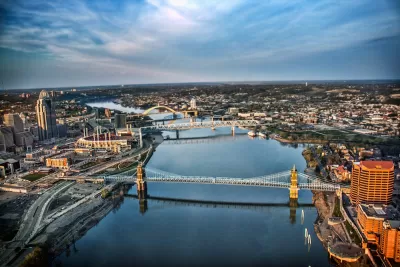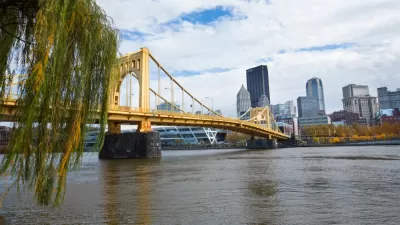Two of the transportation connections between Ohio and Kentucky in the Cincinnati metropolitan area were closed on the same day, leaving one side of the Ohio River cut off from the other.

The Brent Spence Bridge, an important artery for car and truck traffic between Ohio and Kentucky, closed on Wednesday after an overnight truck fire, according to Jake Ryle.
The Brent Spence Bridge is indicative of the massive challenges facing the nation's infrastructure. According to Ryle, "the bridge now carries more vehicles than it was originally designed to carry." Moreover, "the Brent Spence has been listed as 'functionally obsolete' on the federal bridge registry since the 1990s."
The failure of the bridge has Kentucky lawmakers scrambling to make the case for more transportation funding, including a potential bump in the gas tax.
Articles by David Winter and Sam Rosenstiel detail the frustrations the closure will cause commuters in the area.
On the same day as the Brent Spence closure, the John A. Roebling Suspension Bridge was also closed indefinitely "due to numerous and continued violations of the bridge’s weight limits," according to a statement from the Covington Police included in an article by Quinlan Bentley and Madeline Mitchell.
According to that article, "the Roebling, a historic bridge opened in 1867, has an 11-ton weight limit that was put in place after a 2007 inspection." All indications are that one bridge closure led to the other.
"The Cincinnati Police Department issued a warning Wednesday about the risks involved in driving a heavy vehicle -- such as a large delivery truck or semitrailer -- across the historic John A. Roebling Suspension Bridge while the Brent Spence Bridge is closed for an unknown amount of time," according to another article by Pat LeFluer.
FULL STORY: ‘Something has to get done': Community leaders push for solution after Brent Spence Bridge closure

Maui's Vacation Rental Debate Turns Ugly
Verbal attacks, misinformation campaigns and fistfights plague a high-stakes debate to convert thousands of vacation rentals into long-term housing.

Planetizen Federal Action Tracker
A weekly monitor of how Trump’s orders and actions are impacting planners and planning in America.

Chicago’s Ghost Rails
Just beneath the surface of the modern city lie the remnants of its expansive early 20th-century streetcar system.

Bend, Oregon Zoning Reforms Prioritize Small-Scale Housing
The city altered its zoning code to allow multi-family housing and eliminated parking mandates citywide.

Amtrak Cutting Jobs, Funding to High-Speed Rail
The agency plans to cut 10 percent of its workforce and has confirmed it will not fund new high-speed rail projects.

LA Denies Basic Services to Unhoused Residents
The city has repeatedly failed to respond to requests for trash pickup at encampment sites, and eliminated a program that provided mobile showers and toilets.
Urban Design for Planners 1: Software Tools
This six-course series explores essential urban design concepts using open source software and equips planners with the tools they need to participate fully in the urban design process.
Planning for Universal Design
Learn the tools for implementing Universal Design in planning regulations.
planning NEXT
Appalachian Highlands Housing Partners
Mpact (founded as Rail~Volution)
City of Camden Redevelopment Agency
City of Astoria
City of Portland
City of Laramie





























